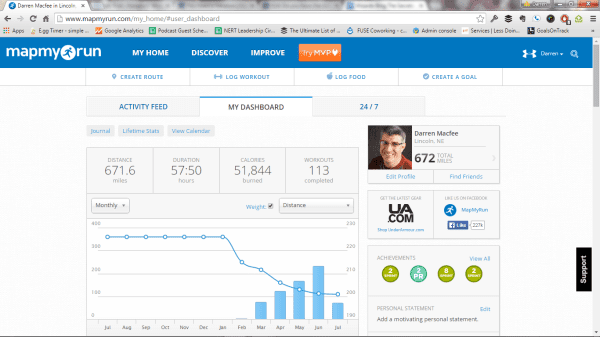My coach recently helped me realize that I’m very successful.
Now, before you think I’ve gone all Donald Trump, let me put some parameters on my statement.
First off, we need to establish a common definition of success. I like how Earl Nightingale put it in his classic book The Strangest Secret: “Success is the progressive realization of a worthy goal or ideal.”
At the beginning of this year, I set a “worthy goal” for myself: I wanted to lose weight. Specifically, I wanted to get down to 200 pounds.
I’m extremely proud to report that in six months I’ve lost 27 pounds (12% of my starting weight). I now weigh 199. What’s more, I’ve done it in a gradual way that I hope to be sustainable; no pills, no crash diets–just a focus on good nutrition and regular exercise. Notice the screen shot below (I only signed up for my FREE MapMyRun account at the end of January, hence the lack of data prior to that).

Now, I’ve failed A LOT in my life, so it’s a little bit hard to admit success. After all, nobody wants to brag.
But, since most Americans want to lose weight, and yet most don’t make any progress toward this worthy ideal, I think I can objectively say that my results are “successful”. They put me in relatively select company.
So, now that we’ve established my “success credentials,” let’s get on to the real point of this post: sharing the lessons I’ve learned and applying them to your “worthy goal” of running a great nonprofit.
To be successful, you have to make big changes.
Henry Ford said, “If you always do what you’ve always done, you’ll always get what you’ve always got.”
I grew up on a farm and was very much a “meat-and-potatoes” guy.
Vegetables? Nope…except for the aforementioned potatoes.
Fruits? Nah.
Dairy? Does ice cream count?
To achieve my weight loss goal, I made massive changes to my diet. I focused on whole foods (apples, oranges, lettuce, tomatoes, etc.). I removed most processed food. I’ve drastically limited my intake of refined sugars. I’ve focused on portion control.
I’ve also made exercise a priority. Every day I do push-ups and planks, and spend at least half an hour riding my bike.
The biking led to another fundamental change, since I had to find time to add new behaviors, and since I can’t add hours to the day. I eliminated most of my time spent watching pointless television.
Here is the point: you can’t just nibble around the edges. If you’re going to start to make progress on that thing that will make you a better leader, you have to be willing to make significant changes. And you have to set aside time to work on it, preferably a little bit every day.
To be successful, you have to be willing to be different.
Two-thirds of Americans are overweight or obese. So, statistically speaking, in America it is “normal” (defined as conforming to the standard or common type) to be overweight or obese.
In other words, to lose weight you need to be ab-normal. You have to behave differently than the vast majority of your peers. Sounds easy, right?
It isn’t.
You see, as social creatures we don’t really want to be different after all. Our inner psychology tells us to “blend in” with the crowd.
Being different is hard. It takes a surprising amount of guts. Just the other day a coworker gave me a hard time as I was counting out my one serving of Wheat Thins for my afternoon snack. I’ve been called neurotic for eating an orange every day at 10:00 a.m. My neighbor thinks the only thing I do is ride my bike.
If you’re going to run a great nonprofit, you have to have the courage to do things differently than your peers. If you’re simply moving in lock-step with the masses, you’ll be average.
Life is graded on a curve. You want to be better than average. You want to be positively abnormal.
To be successful, you have to really want it.
Most efforts to change begin with lots of enthusiasm. See New Year’s resolutions.
Soon, though, the psychological benefit of new and different wears off. That’s when we want to quit. To rush back to our comfort zone.
That’s why you need a “big why”.
My big why is this: I needed to be a better version of me for my family. I needed more energy so I could be “more” for my kiddos. I wanted to be fit and trim because my wife doesn’t deserve a chubby blob on her arm.
I want to be around for many more years.
Why do you want to be a better nonprofit leader? Be honest with yourself. Are you building your resume for another job? Do you want to make more money?
Or maybe you want to solidify your standing in your current role. Maybe you’re building a legacy.
Once you’ve identified your big why, you need to keep it in focus every day. Read it aloud. Journal about it. Keep it top of mind.
You may never reach your goal.
The last lesson is the strangest to me. It is this: you’ll probably never reach your goal.
I don’t mean this in a “the odds are too daunting” sort of way. Quite the opposite.
As I’ve lost more weight, I’ve decided that I want to lose even more weight. At first my goal was to get to 200 pounds. Now that I’m there, I want to keep going.
Look back at Nightingale’s definition: the progressive realization of a worthy ideal.
Achievers keep raising the bar on themselves. They are motivated by the challenge more than the accomplishment.
Think back to a goal you accomplished. I’ll bet by the time you actually realized the goal, you had already acknowledged it in your psyche, celebrated it, and reset your new goal even higher.
You hit that membership goal for the year? The one you thought would be a big stretch? AWESOME!
Now, how much can we beat it by next year?
It’s okay to always be pushing. It’s what makes you a leader.
What do you think?
 Have you made big changes to old behaviors? Have you dared to be different? I’d love to hear about it! Send me a message or hop over to the Nonprofit Wizards Facebook page!
Have you made big changes to old behaviors? Have you dared to be different? I’d love to hear about it! Send me a message or hop over to the Nonprofit Wizards Facebook page!
Darren Macfee is the founder of the Nonprofit Wizards. His life purposes are to dispense homespun wisdom, grill a perfect meal for his family, and help nonprofit leaders create amazing results for and through their organizations. Follow him on Twitter @NPWizards or send him a note. Be sure to sign up for alerts so you never miss a post.

Love Works: Seven Timeless Principles for Effective Leaders by Joel Manby

Strengths Based Leadership: Great Leaders, Teams, and Why People Follow by Tom Rath and Barry Conchie

Leading Out Loud: A Guide for Engaging Others in Creating the Future by Terry Pearce
 Leading with Soul by Lee Bolman
Leading with Soul by Lee Bolman
 The Effective Executive: The Definitive Guide to Getting the Right Things Done by Peter F. Drucker
The Effective Executive: The Definitive Guide to Getting the Right Things Done by Peter F. Drucker
 The Bully Pulpit: Theodore Roosevelt, William Howard Taft, and the Golden Age of Journalism by Doris Kearns Goodwin
The Bully Pulpit: Theodore Roosevelt, William Howard Taft, and the Golden Age of Journalism by Doris Kearns Goodwin
 Good to Great: Why Some Companies Make the Leap…And Others Don’t by Jim Collins.
Good to Great: Why Some Companies Make the Leap…And Others Don’t by Jim Collins.
Some titles above are affiliate links. If you’re not sure why you should care click here. You’ll also learn how you can help feed the children.


